By Charlene Muhammad CHARLENEM
Clear strategy, unity called keys to success
Experts discuss punishing Sunshine State and need to strengthen Black economy
- Justice for Trayvon ignites a new movement, say activists (FCN, 07-23-2013_
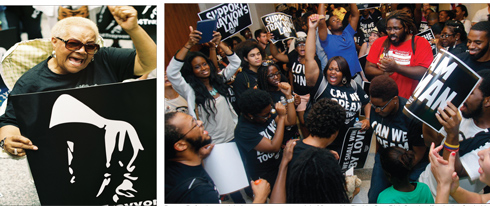
(FinalCall.com) – Calls for a boycott in the wake of a Florida jury’s acquittal of the man who killed 17-year-old Trayvon Martin have raised questions about whether Black America’s financial divestment from the tourist state would produce a strong enough economic chokehold to forge meaningful changes in its gun laws, given one juror’s claim law forced the six-person jury to set the killer free.
The boycott calls also raise questions and recommendations about what Blacks should do with the money pulled out of the Sunshine State–and what could be done with hard earned dollars whether a nationwide boycott is launched or not.
According to the governor’s office, visitors to Florida spent a record $71.8 billion in 2012, an increase of 6.8 percent over 2011. “This represents a record year of spending in 2012 by tourists in Florida, exceeding the previous highs of $67.2 billion in 2011 and $65.5 billion in 2007,” according to Gov. Rick Scott.
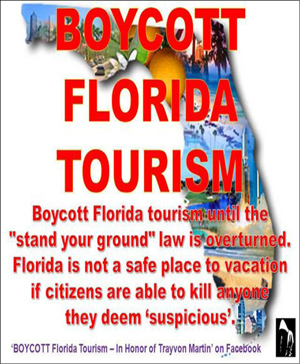
“Travelers to Florida spent an additional $4.6 billion in 2012, marking the second consecutive record year for visitor spending in the Sunshine State. Florida’s tourism industry is critical to Florida families as it serves as a vital source of revenue to the state and a key driver of employment,” he said earlier this year.
Visit Florida, the official destination marketing organization, reported 2012 visitors spent over 500 million vacation nights and nearly $72 billion in the state, the world’s top vacation destination.
Florida is also a leader in agriculture and other industries: According to state figures, 40 percent of all U.S. exports to Latin and South America pass through Florida; the space industry represents $4.1 billion of the state’s economy and employs 33,000 aerospace workers; the state produces about 67 percent of the U.S. oranges and accounts for about 40 percent of the world’s orange juice supply, and has significant income and jobs in service, software, health technology and university research.
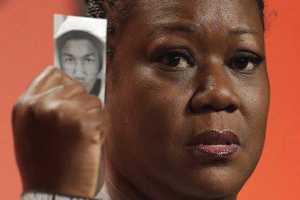
Hurt Florida, but help self
Financial experts interviewed by The Final Call say economic pressure over the July 13 acquittal of George Zimmerman on second-degree murder charges presents a great opportunity for Blacks to address a growing wealth gap with White America.
“There’s a lot of noise out there regarding the Zimmerman—Trayvon case and we boycott all the time. We just don’t realize it. Probably the biggest boycott that Black America is involved in right now is our own community, our own race,” said Dr. Dennis Kimbro, a researcher, educator and best selling author.
Dr. Kimbro was referring to the $1.2 trillion economists say leaves the Black community each year, when many Black-owned businesses provide some of the same, if not better, goods and services as outsiders.
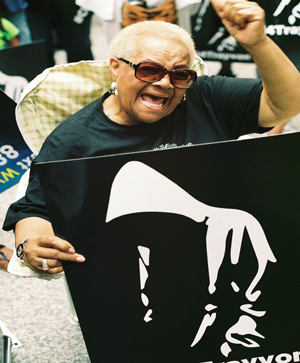
If Blacks exercised greater spending among themselves, it would not only close the wealth gap, but Blacks would have a surplus, Dr. Kimbro insisted.
“Now, it’s easier said than done in terms of Florida, simply because you’re dealing with Marketing 101 and you’re dealing with a new generation of African Americans who really, I don’t want to use the term ‘have yet been tested,’ but we don’t know their commitment level,” Dr. Kimbro said.
He compared the post-verdict conditions to when Dr. Martin Luther King, Jr. led the Montgomery Bus Boycott in 1958. There were only five Black millionaires in the United States then, he noted. But today, there are 35,000 Black millionaires and five Black billionaires, he continued.
Yet, Dr. King was savvy and entrepreneurial in his effort to raise awareness about the boycott, Dr. Kimbro said. The boycott was scheduled to take place only on December 1, but since Dr. King had 99 percent participation in Montgomery’s Black community, he decided to extend the action and attach some demands to it, according to Dr. Kimbro.
Black America should do the same thing now, he argued. He recommends taking a stand on one particular day or month and if participation is effective, extend the Florida boycott.
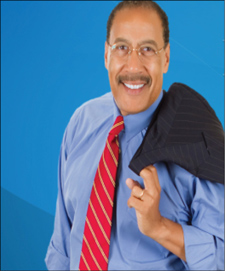
“But to just say we’re going to boycott economically Florida, that’s a little bit haphazard and the buy-in level, you’ll get better buy-in if you go from the broad to the narrow, from the general to the specific,” he added.
To date, a host of entertainers and organizations have dropped plans to perform in Florida unless and until it gets rid of its controversial Stand Your Ground law. The law allows citizens to use deadly force if they feel threatened, even when there’s an alternative exit.
Iconic R&B artist Stevie Wonder bolstered desires to boycott when he announced he would not perform in Florida or any state that has similar laws.
Since then, media reports indicate, entertainers Eddie Levert of the O’Jays and gospel duo Mary Mary have confirmed they have joined Mr. Wonder in his boycott. Kanye West, Rod Stewart, Madonna, Usher, Trey Songz, Young Jeezy, Rhihanna, Alicia Keys and Dionne Warwick have reportedly also vowed not to perform in Florida.
“I take my hat off to Stevie and Stevie has a strong activist and social responsibility mode. He’s not new to this game and he’s one of the brothers fighting in the trenches. But again, you’ve got to look at this as not only a media ploy but you’ve got to use Marketing 101 in order for this to be effective,” Dr. Kimbro said.
Goals, timelines and targets needed
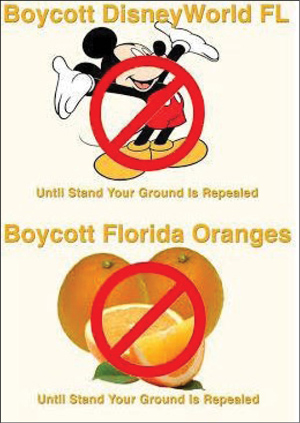
First, progress the starting point from Stevie Wonder and heighten awareness by making sure whether in New York, Miami, Houston, L.A. or Seattle, the Black community gets the word out, he instructed. Second, figure out a time period, he added.
“Are we going to do this ad-infinitum? And who are we really going after? Are you going after Stand Your Ground, or if you’re saying we’re not going to buy orange juice. We’re not going to buy grapefruits, there’s a market segment that agrees with us on this Stand Your Ground that’s going to be wiped out and that’s migrant workers in Florida, a Hispanic community,” Dr. Kimbro said.
Black, White, Brown, and Asian–use everyone concerned about this problem and amenable to boycotting to map out an effective strategy, he continued.
Reverend Jesse Jackson, civil rights leader and founder of the Rainbow PUSH Coalition, has argued for stopping conventions and boycotting Florida as an “apartheid state.”
According to Reverend K.W. Tulloss, of Reverend Al Sharpton’s National Action Network’s Los Angeles chapter, the civil rights leader and host of MSNBC’s “Politics Nation” has not yet issued an official position.
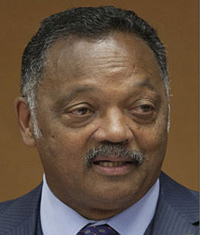
“We are exploring all options regarding the next steps on Florida … Our focus right now is these Stand Your Ground laws,” Rev. Tulloss said.
In listening to the pulse of the people, Rev. Tulloss said many have indicated small boycotts are already taking place, such as not buying orange juice. But a real dialogue must occur between those for and those against a boycott in order to determine the real costs to the masses, the loss to Blacks, allies in Florida, and any potential impact, he said.
A national boycott would impact many people, particularly in Florida, but any effective outcome would require sacrifice, which is part of the struggle, he continued.
“I just hope the community remains engaged around Trayvon Martin and the calls for the Justice Department to investigate and I hope we can continue to better serve our community,” Rev. Tulloss added.
Dr. Harry Alford, president and CEO of the National Black Chamber of Commerce, said a boycott is not a prudent response in this case.
What happened was indeed tragic and a response is in order, but the people of Florida weren’t the perpetrators, particularly the 3.4 million Black folks who live there, nor the businesses they own, he said.
“I don’t think we should bring the wrath down on them because they did not cause this mess. I think it’s kind of like shooting your foot to prove a point and I don’t think it would succeed. There’s no clearcut vision like apartheid in South Africa, but it was a clearcut villain,” Dr. Alford told The Final Call.
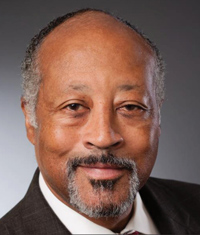
An international boycott of South Africa forced the end of apartheid, a legalized system of racial segregation in which the White minority ruled and discriminated against the Black majority.
Similarly with the Montgomery Bus Boycott, it was Blacks boycotting the White power structure and White owners of busses that directly affected the races, Dr. Alford noted. “We’d rather walk than to do business with them. When it’s clear cut like that, it works. I don’t see how that would work in Florida,” said Dr. Alford.
The problem is further complicated because society is not as overtly segregated as it used to be. People can’t so easily choose to only go to Black theaters, Black grocery stores, or Black gas stations.
He feels Blacks lack the money to really impact somebody in a boycott and more unity is needed. He recommends using the power of the Black vote in Florida to help change the law.
Dr. Alford recommends Blacks use their trillion dollar income after taxes to do business with Black-owned institutions. “We need to look in the mirror. I’ll go back to Booker T. Washington and Marcus Garvey and Elijah Muhammad. They all preached it: if we own our own businesses and do business with each other, we would prosper. All three of them said that.”
Dr. Kimbro concurred, stating, whether entertainers or everyday people boycott Florida or not, the Black community still has a lot of economic work to do.
Sometimes objectives are met and sometimes compromise becomes necessary but at the end of the day objectives must be solidified, he said. In this case, that means deciding whether it’s to repeal Stand Your Ground, heighten awareness, or target Black spending habits, he said.












